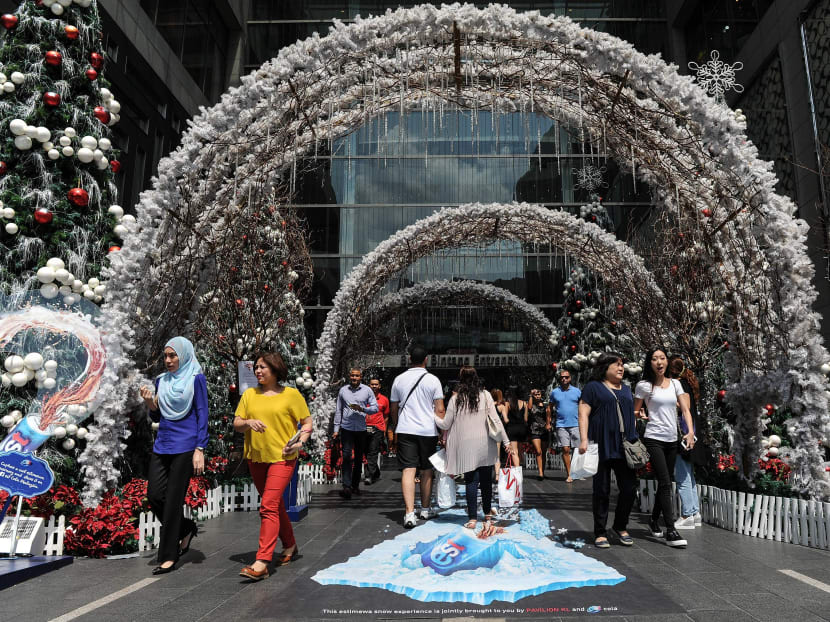Malaysian economy expands at fastest pace in more than 3 years
KUALA LUMPUR — Malaysia’s economy grew at the fastest pace in more than three years in the third quarter, supported by resilient domestic demand and strong exports.

Shoppers walk under Christmas decorations at a shopping mall in Kuala Lumpur on December. Malaysia’s economy grew at the fastest pace in more than three years in the third quarter, supported by resilient domestic demand and strong exports. Photo: AFP
KUALA LUMPUR — Malaysia’s economy grew at the fastest pace in more than three years in the third quarter, supported by resilient domestic demand and strong exports.
South-east Asia’s third-largest economy has recovered this year after a rocky 2016, when growth slumped to its slowest pace since the global financial crisis in 2009. The turnaround may encourage Prime Minister Najib Razak to call a general election before the August 2018 deadline.
Describing Malaysia's 2017 economic performance as an achievement, Mr Najib Razak on Friday (Nov 17) said this means Malaysia is among a handful of countries this year that recorded an accelerated growth.
The growth is also in line with the demands of Islam, which sets the highest standards in all matters, he added.
“As Muslims, we have to set a high level of excellence in whatever it is we want to achieve. As such, we need to ensure that whatever targets we set for ourselves, we give our best to achieve them,” he said.
The ringgit climbed to 4.158 versus the dollar on Friday (Nov 17) after the Gross Domestic Product (GDP) data was issued, its highest in a year. It has been hitting fresh year-highs since Wednesday.
Malaysia’s economy grew 6.2 per cent in the third quarter from a year earlier, topping a Reuters poll forecast of 5.8 per cent and recording the fastest growth since the second quarter of 2014.
Private sector consumption surged 7.2 per cent in the third quarter from a year earlier, while investments climbed 7.9 per cent. Exports increased 11.8 per cent, imports surged 13.4 per cent while manufacturing growth accelerated from 6 to 7 per cent.
Malaysia’s central bank governor Muhammad Ibrahim said the economy was on track to register growth of 5.2 to 5.7 per cent this year and may even exceed that estimate.
“Exports and the numbers look good so it would be a pleasant surprise (if GDP exceeds 5.7 percent). But watch for the external environment. That will influence our growth, not only for Malaysia but also the world,” Mr Muhammad said at a news conference.
The government had earlier revised its 2017 full-year projection up from 4.3-4.8 per cent.
Domestic demand and exports will likely remain strong enough to prop up the economy going into the next quarter, with risks narrowing as the global economy stabilises, Mr Muhammad said.
Malaysia’s current account surplus grew to RM12.5 billion (S$4.07 billion), up from RM9.6 billion in April - June.
The central bank said the ringgit currency has strengthened, but risks remained.
“Ringgit levels are a reflection of our economic strength, and there is more liquidity in the market now and it is not influenced by speculative flows anymore,” Mr Muhammad said.
“It is more reflective of financial flows in the domestic market.”
In November last year, the central bank stepped in to discourage ringgit trade in the non-deliverable forwards (NDF) market, and later introduced measures to boost onshore ringgit trade.
The ringgit has so far gained 7.2 per cent on the dollar this year after hitting a near 19-year low of 4.4980 on Jan 4.
The central bank held left its benchmark rate unchanged last week but raised the possibility it may review the rate to suit improving economic conditions.
Mr Muhammad said the bank will look at a review based on incoming data. If there was to be any change it would not be so much a tightening as a “normalisation” of the rate.
The central bank expects inflation to be in a higher range of 3 to 4 per cent for 2017, depending on oil prices.
The projected spike in inflation would be a worry for Mr Najib, who may face a backlash from voters angered by rising living costs and the introduction of a broad-based consumption tax in 2015.
The premier faces his toughest election yet as he looks to counter bad publicity from a corruption scandal involving state-owned fund 1Malaysia Development Berhad (1MDB) and a growing challenge from former prime minister Mahathir Mohamad, his former mentor turned rival.
Last month, Mr Najib unveiled his last annual budget before the polls, promising sweeteners that would cut personal income tax for lower-income citizens, pay more to pensioners and spend billions on schools, hospitals and rural infrastructure.
The central bank said a “holistic review” of the foreign investment incentive framework was needed, but did not elaborate. AGENCIES






